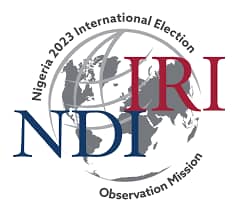
By Angela Atabo
The Joint Delegation of the International Republican Institute (IRI) and the National Democratic Institute (NDI), have expressed worry over Nigeria’ s readiness to hold hitch-free elections in 2023.
The IRI and NDI delegations made this known while presenting the Second Joint Pre-elections Assessment Statement to journalists in Abuja on Friday.
The assessment conducted from Dec. 4 to 9, was built on the first assessment mission which visited Nigeria in July 2022.
The delegation included, Senior Fellow for Africa Policy Studies at the Council on Foreign Relations,Michelle Gavin, Judge Pillay, Programmes Director of the Zimbabwe Election Support Network, Ellen Dingani, IRI Director for Africa, Gregory Kearns and NDI Deputy Director for Central and West Africa, Dr. Sophia Moestrup.
According to them, a major concern affecting most parts of Nigeria is insecurity driven by extremist and sectarian violence ,banditry and proliferation of informal security forces.
“A worrying trend since NDI-IRI July assessment mission is the significant increase in electoral violence often targeting INEC facilities election materials opposing candidates, party supporters and women leaders.
“Many interlocutors with whom the delegation met expressed concerns about the continued role of money politics in Nigeria and the lack of accountability for electoral offences including vote buying .”
The group also expressed concern over the decline in the number of women running for electoral offices in the 2023 elections.
The group said the overall percentage of women running for elections has declined from 13 per cent in 2019 to 8.9 percent in 2023, a development the institutes described as a “disappointment” for Africa’s largest democracy.
According to them, the insecurity challenges being experienced in Nigeria , if left unaddressed, could negatively impact the credibility of the polls and increase the risk of post-election violence.
The group however, commended INEC for the introduction of the bimodal voter automated system (BVAS), the institutes warned that, “if there were to be widespread malfunction of the BVAS machines as occurred with the smart card readers in 2015, it could undermine the perceived legitimacy of the elections and spark violence.”
The delegations said that although Nigeria has witnessed a surge in registration of young people, the organisations said there were still significant barriers for young people and other traditionally marginalized groups to participate in the electoral process as candidates.
They called on INEC to clarify how it would tackle the issues of underage voters, double registrations and any other criteria that would result in a voter being removed from the voter roll .
They also called on the commission to conduct national stress tests of the BVAS machines and the IReV system to ensure they are prepared to function effectively on election day across more than 176,000 polling units.
They added INEC should complete surveys of internally displaced persons camps in all states, and provide clear guidelines on the process by which IDPs, including those not living in IDP camps, will vote in the election.
They called on candidates and political parties to adhere to the principles in the peace pledges facilitated by the National Peace Committee ahead of the elections.
They further urged them to refrain from engaging in violence against electoral opponents.
They called on all presidential candidates to commit publicly to accept results of credible elections while grievances arising before, during and after the elections should be channelled through the appropriate legal process.
They also called on security forces to proactively identify wards at high risk of strategic election violence and focus their resources on tackling it.